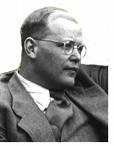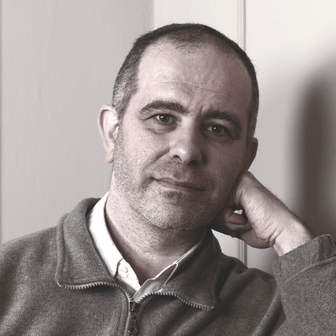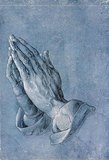Dietrich Bonhoeffer

Dietrich Bonhoeffer was born on February 4th 1906
in Breslau, Germany.
He took a degree in theology in Berlin in 1927. He was a pastor in
the German Protestant parishes of Barcelona and London.
In 1931 he began teaching at the faculty of theology of Berlin and
was ordained pastor. At that time, he began his activity in the
infant ecumenical movement. He was elected youth secretary of the
World Union in the same year for the collaboration between the
churches and in 1933 joined the Universal Christian council "Life
and Work" (from which the ecumenical Council of the Churches would
later be born). He taught in Berlin from 1931 to 1933. With "The
church and the Jewish Question", published in April 1933, he was
the first to tackle the relationship between the Church and the
Nazi dictatorship, vigorously claiming that the Church had the duty
to oppose political injustice.
Bonhoeffer refused the position of pastor in Berlin, in sympathy
with those who were being excluded from the ministry for racial
reasons, and decided to move to a German-speaking congregation in
London. In May 1934, the so-called "Confessing Church" was founded
by a minority within the German Evangelical Church that adopted the
Declaration of Barmen in opposition to Nazism. In April 1935 he
returned to Germany to lead an underground seminary for the
training of pastors of the Confessing Church, which was under the
increasing pressure of the Gestapo, culminating in August 1937 with
the Himmler Decree, which declared the illegality of training
pastor candidates for the Confessing Church. In the two years that
followed, Bonhoeffer continued his teaching activity secretly; in
January 1938 the Gestapo exiled him from Berlin and in September
1940 he was banned from speaking in public.
In 1939 he approached a group of resistance and conspiracy against
Hitler.
In 1943 Bonhoeffer was confined in the military prison of Tegel,
the plot against Hitler having been discovered.
He was hung together with the other conspirators on the
concentration camp of Flossebürg on April 9th 1945. His
letters and the notes he wrote while in prison and that he sent to
his friend E. Bethge, were published by this latter in 1951,
together with the letters to his parents and a number of poems,
entitled Letters and Papers from Prison.
During his life, Bonhoeffer had published Sanctorum Communio
in 1930, Act and Being in 1931, The Cost of
Discipleship in 1937, Life Together in 1938. Appearing
later were his works that, according to the author, were to be his
greatest contribution: Ethics (1949); Temptation
(1953); Il Mondo Maggiorenne (1955-66).

Ciao,
mi chiamo Stefano.
Piemonte Sacro è la mia passione dal 2001.
AIUTA il progetto Piemonte Sacro a crescere
DONA SOLO 2 euro! Te ne sarò GRATO .




